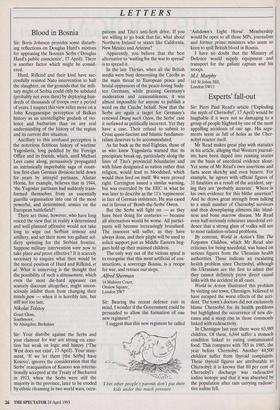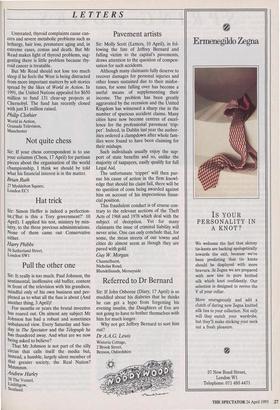Experts' fall-out
Sir: Piers Paul Read's article (Exploding the myth of Chernobyl', 17 April) would be laughable if it were not so damaging to a group of people blighted by one of the most appalling accidents of our age. His argu- ments seem as full of holes as the Cher- nobyl reactor itself.
Mr Read makes great play with statistics in his article, alleging that Western journal- ists have been duped into running stories on the basis of anecdotal evidence alone. Yet some of Mr Read's own assertions and facts seem sketchy and even bizarre. For example, he agrees with official figures of 31 fatalities as a result of the accident, say- ing they are 'probably accurate'. Where is his own evidence for this blithe assertion? And he draws great strength from talking to a small number of Chernobyl survivors and then downplaying ailments like blind- ness and bone marrow disease. Mr Read even half-seriously rehearses anecdotal evi- dence that a strong glass of vodka will see to most radiation-related problems.
By contrast, World in Action's film The Forgotten Children, which Mr Read also criticises for being anecdotal, was based on serious figures from the Ukranian health authorities. These indicate an escalating health problem since Chernobyl, although the Ukranians are the first to admit that they cannot definitely prove direct causal links with the accident in all cases.
World in Action illustrated this problem by visiting one town, Chernigov, believed to have escaped the worst effects of the acci- dent. The town's doctors did not exclusively blame Chernobyl for its health problems but highlighted the occurrence of new dis- eases and a steep rise in those commonly linked with radioactivity.
In Chernigov last year there were 63,989 children. Of these, 6,844 suffer a stomach condition linked to eating contaminated food. This compares with 783 in 1985, the year before Chernobyl. Another 44,500 children suffer from thyroid complaints. These thyroid figures are attributable to Chernobyl: it is known that 80 per cent of Chernobyl's discharge was radioactive iodine isotope and that it was absorbed by the population after rain carrying radioac- tive iodine fell.
Untreated, thyroid complaints cause can- cers and severe metabolic problems such as lethargy, hair loss, premature aging and, in extreme cases, comas and death. But Mr Read makes light of thyroid problems, sug- gesting there is little problem because thy- roid cancer is treatable.
But Mr Read should not lose too much sleep if he feels the West is being distracted from more important matters by sob stories spread by the likes of World in Action. In 1991, the United Nations appealed for $650 million to fund 131 clear-up projects at Chernobyl. The fund has recently closed with just $1 million raised.
Philip Clothier
World in Action, Granada Television, Manchester



























































 Previous page
Previous page